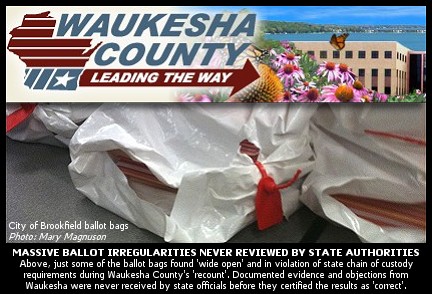
Last Monday, May 23rd, Wisconsin's Government Accountability Board (GAB), the state's top election agency, officially certified [PDF] the controversial results of the extraordinarily close April 5th statewide Supreme Court election and its subsequent “recount.”
However, as The BRAD BLOG has learned, the agency certified those results without reviewing hundreds of official exhibits documenting wholesale ballot irregularities, on-the-record objections from the attorneys of the candidate who filed for the “recount,” and thousands of pages of official transcripts and minutes documenting the entire “recount” process from the election's most controversial county.
Even more alarming, the agency doesn't even yet have a copy of the hundreds, if not thousands, of pages which make up the official minutes documenting the nearly month-long “recount” from Waukesha County —- the last of the state's 72 counties to complete its count, and by far the most controversial county following the late discovery there of some 14,000 votes not included in the county's original Election Night results.
Indeed, the GAB admits, they may not even have those minutes for another two weeks, despite the already-issued certification of the election results, and despite the fact that the statutory deadline for a candidate to file a challenge to those certified results in court is tomorrow (Tuesday).
The official minutes from most of the other 71 counties, as documented during the “recount” of the razor-thin, highly contentious election for a 10-year term on the state's high court between incumbent Republican Justice David Prosser and his independent challenger Asst. Attorney General JoAnne Kloppenburg, have been posted on the GAB's website for some time, with the 71st, Milwaukee County, finally posted late last week.
With Kloppenburg set to announce her decision on whether to seek a judicial review tomorrow, Waukesha's lengthy and detailed minutes are not posted for public review with all of the others, despite massive and alarming irregularities discovered during the “recount” process there over the past month (see here, here, and here for just a few of many examples), because the GAB has not been given them by the county, as state officials conceded during phone conversations late last week…
'Can the People of Wisconsin Stand for This'?
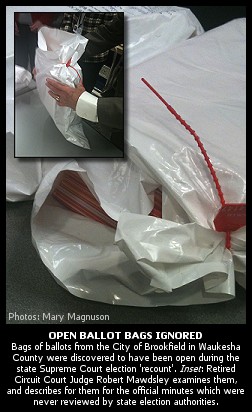
While state statutes are very specific on the removal of defective or irregular absentee ballots discovered during the “recount” process —- indeed, irregular absentee ballots were removed from the “recount” results for lack of witness signatures and other such defects —- the handling of irregularities discovered for non-absentee ballots is virtually unspecified in the election code.
The result: the weight of non-absentee ballots, where defects are often ignored, is ultimately greater than those of absentee ballots cast in WI.
When irregular non-absentee ballots —- such as those found in “wide open” ballot bags in Waukesha's City of Brookfield or ballots bags with missing or scratched out or changed serial numbers are discovered, in violation of chain of custody procedures —- objections are to be raised by a candidate's attorney or specified representative, recorded in the minutes for later review, and then ballots are counted and included among the results anyway.
After that count is complete, the GAB is to canvass the new results by, among other things presumably, reviewing the minutes and any objections raised during the process. They then certify that the results as “recounted” are “correct.”
During the course of the “recount,” The BRAD BLOG was told on several occasions by officials at the GAB that they could not comment on irregularities, such as opened bags, or missing security serial numbers, until after they had the opportunity to review the minutes, exhibits, and objections from the county “recount” in question.
Following GAB certification, according to Wisconsin's statutes, a candidate then has just five business days to review all of the results, the documentation of the counting (including the minutes from each county), and all of the objections and evidence on the record, in order to determine if they would like to exercise their right for a judicial review challenging the certified results.
The question of how the GAB is able to “certify” the results as “correct,” without having bothered to even review minutes, objections, and hundreds of evidence exhibits in all of the 72 counties, raises yet more serious questions about Wisconsin's election processes and the ability to ascertain the will of the voters, even as the results of this election, which will affect the balance of the state's high court for the next 10 years at one of the most turbulent moments in state history.
“When I think of the number of people who interrupted their lives to volunteer to observe the recount, the effort that went into finding, training, and coordinating the volunteers, the money spent by taxpayers and the campaigns to staff and support the recount, and —- most importantly —- the giant hole this leaves in the supposed verification of this election, I feel sick,” Emily Levy of Velvet Revolution's non-partisan Protect Our Elections campaign told us after learning that the GAB never even received, much less reviewed, Waukesha's minutes. [Disclosure: The BRAD BLOG is a co-founder of election watchdog and good government advocate VR.]
“How could the GAB certify the recount without having seen the reports of irregularities? And how can the people of Wisconsin stand for this? Or will they?” she wondered.
According to Wisconsin election statutes [9.01(5)(a)], the recount “minutes shall include a record of objections and offers of evidence.” They go on to state [9.01(5)(bm)] that “Upon the completion of its proceedings, [the] board of canvassers [from each county] shall deliver to the [the GAB] one copy of the minutes of the proceedings.”
Indeed, during a phone conversation Levy had late last week with GAB Elections Division Administrator Nathaniel Robinson and Election Specialist Ross Hein, who describes himself as the “project manager for the recount effort,” Hein conceded there were some “840 exhibits documented” during the Waukesha count, and that each one must be entered into the minutes.
Further, he explained to Levy, due to the length and detail of the Waukesha count —- the nexus of much focus for Kloppenburg supporters, given the still-unexplained “human errors” blamed for the reporting of election-reversing results announced two days after the election by Republican activist and former Prosser colleague, Kathy Nickolaus, Waukesha's controversial County Clerk —- the county's counsel said three assistants were working “full-time” on compiling the minutes and expected them to be complete and turned over to the GAB “within two weeks” from last Friday.
Nonetheless, the Kloppenburg campaign has a statutory deadline of Tuesday, May 31 (five business days following GAB certification, with the holiday weekend taken into account), to file a judicial challenge to the results if they so choose.
Just 'One Vote Per Ward' Could Change the Outcome
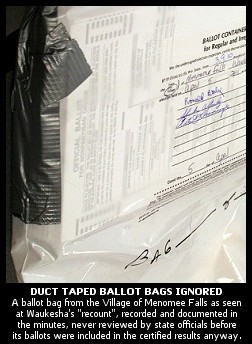
As per Wisconsin's “Recount” statutes [9.01], as The BRAD BLOG detailed just over a week ago, during the waning days of Waukesha's counting, challenges to the certified results of the “recount” require the contesting candidate to detail evidence of enough irregularities that, were they to be removed from the results, the outcome of the election is likely to be reversed.
Proving that fraudulent ballots were counted is not a requirement of those statutes.
“Generally, to successfully challenge an election,” a helpful footnote in Wisconsin's election code reads, “the challenger must show the probability of an altered outcome in the absence of the challenged irregularit[ies].”
For the past several days, Levy has been working with some 50 election integrity volunteers, the majority of the them from Wisconsin, who have been reviewing the minutes from counties across the state to identify documentation of irregularities. Most of the minutes being reviewed are “from counties where we've been led to believe everything went fine,” she says.
She explains that the volunteers “are finding all kinds of problems that indicate significant irregularities in the vote count.”
She also adds the important observation that “this was a close enough election that if an average of just one vote per ward was miscounted for Prosser instead of Kloppenburg, for any reason, the election outcome would be changed.”
The volunteers' ongoing analysis of “recount” minutes from across the state —- some 3,500 pages which, so far, include the documentation of “thousands” of irregular ballots, she says —- does not include the minutes from Waukesha County, since they have not been made available to either the G.A.B. or the public with the rest of the counties' minutes.
'Procedures Neither Adequate Nor Adequately Followed'
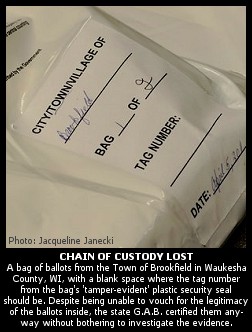
On Election Night, challenger Kloppenburg was declared to have been the winner by a razor-thin 204 vote margin.
Two nights later, during a stunning evening press conference, Nickolaus announced 14,000 votes from Waukesha's City of Brookfield which, she says, were not included in her original Election Night totals. The new numbers from the heavily Republican Waukesha County, home of Prosser's election headquarters, flipped the results in the incumbent's favor, giving him a lead by some 7,500 votes out of more than 1.5 million ballots cast. The unverified 0.488% margin over Kloppenburg entitled her to request a state-sponsored “recount” which she called for on April 20th, along with an independent investigation of Nickolaus (who has a long history of questionable election results) and her procedures.
When ballot bags from the City of Brookfield were examined during the “recount” on May 5th, observers were alarmed to discover that many of them, five out of six in the very first batch examined, had been “wide open,” as noted by the retired circuit court judge overseeing the counting there, and as detailed in exclusive photographs published by The BRAD BLOG. The Kloppenburg campaign objected to them, the objections were noted for the minutes (the minutes never received or reviewed by the state GAB) and the unverifiable ballots were counted and included in the GAB-certified results anyway.
“This election was far from clean,” election integrity expert Levy told us. She has been following reports from “recount” observers closely over the past several weeks, and working with others to organize the volunteers' analysis of the published minutes over the past several days.
“Whether or not there was fraud remains to be seen. But at the very least, the procedures in Wisconsin are neither adequate nor adequately followed,” she says. “That is what has been verified by this recount, rather than the results of this crucial election.”
During the course of the “recount,” some 2,700 votes from the original tally were found to have been counted inaccurately, according to the results posted each day throughout the “recount” by the GAB That number comes as the results of hand counts of paper ballots in just 31 of the state's 72 counties. The rest of the ballots cast were re-tallied by the same oft-failed, easily-manipulated computer systems made by companies like Diebold, ES&S, and Sequoia, which tallied them originally, either accurately or inaccurately, on Election Day.
The GAB's certified results declare Prosser the winner by 7,004 votes, or 0.46%. That margin includes the results from thousands of ballots found to be irregular for various reasons during the count, objected to by the Kloppenburg campaign in each instance, and then included in the results nonetheless, without review by the state agency.
If just over 3,500 “irregular” votes for Prosser, out of the 1.5 million cast overall, might have been cast originally for Kloppenburg instead, that would be enough to change the outcome of the election, as called for by Wisconsin statutes.
Protect Our Election.org's Levy says their still-incomplete analysis of county minutes has, so far, found “far more irregularities than that” —- even without being able to review the unavailable documentation and objections to Waukesha's more than 125,000 ballots where Prosser is said to have won by a nearly 3 to 1 margin.
Key word: 'Abstract'

When we recently inquired how the GAB would be able to confirm that ballots counted during the “recount” were actually the ones cast on Election Day, given the extraordinary number of ballot bags and security procedures which were found to have been in violation of the state's secure chain of custody procedures, they cited the computer printed results from Election Night.
In agreement with statements given to us by the Prosser campaign, the GAB said that if the “recount” numbers generally match Election Night poll tapes printed out by the tabulation computers, they were satisfied that there was no fraud. That, even though The BRAD BLOG has long detailed, as based numerous studies, analysis, and testing by computer science and security experts, how easily electronic tabulation systems can be gamed; how county clerks like Waukesha's Nickolaus had unfettered access to the ballots for some three weeks prior to (and during) the “recount,” as of 4pm on the day following the election; and how Wiconsin “recount” procedures include no reconciliation of unvoted (blank) ballots which could be used to replace legitimate ones.
But where the GAB feels confident in relying on Election Night poll tapes, we detailed in that same article (with photographs) the discovery of an “Official Results Report” poll tape from Waukesha's City of Pewaukee dated March 30th, seven days prior to the April 5th election. Officials offered no explanation for the misdated tapes.
As well, we quoted documentation from minutes in two other counties (Door and Taylor) detailing three different towns (Forestville, Cleveland, and Pershing) where electronic voting machines never printed voter-verifiable poll tapes at all on Election Day, assuring that it was strictly impossible for voters to have confirmed the accuracy of computer printed vote records before they selected the button to cast their wholly unverifiable electronic ballots.
And yet, those are among the “poll tapes” the GAB says can be relied upon to ensure that the count was accurate, despite all of the irregular ballots and ballot bags discovered and documented in the minutes.
Last Monday, May 23rd, the day the GAB certified the Supreme Court “recount” results, they issued a simultaneous announcement in which Director and General Counsel Kevin J Kennedy is quoted as offering understated recognition of the still-undetermined number of irregularities revealed during the third statewide “recount” in Badger State history.
“As expected,” Kennedy said, “the recount process identified issues to address and procedures which can be improved. Each of the 1,500,130 ballots was reviewed during the recount to determine the correct results. Both candidates were able to raise questions and challenge ballots in a completely open and transparent manner. To the extent that either candidate believes any decisions or procedures affected the outcome of the election, they may seek a court review of the results.”
Seeking a court review of the results, however, is more easily and expensively (both financially and politically) said than done, particularly as Kloppenburg's independent campaign is not backed by either of the state's two major parties, and as Prosser partisans and their friends in the media have already begun pounding the Asst. Attorney General for daring to try and transparently verify the results of the election in the first place.
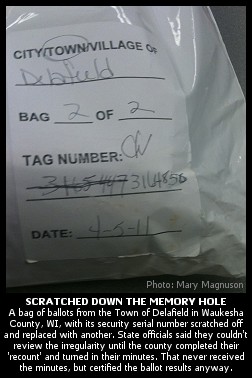
Early in the recount process, at the beginning of May, after a ballot bag from the Town of Delafield appeared at the “recount” with a serial number that was not recorded at all on the Election Night “Inspector's Report,” along with several bags that were torn and/or featuring scratched out and replaced security serial numbers, we asked the GAB for an explanation of the irregularities after the Kloppenburg camp objected to them being counted, but they were counted nonetheless.
GAB spokesman Reid Magney had not yet heard about the Delafield problems, but said the state board would not be able to comment on such matters until after they had had the chance to review the county's minutes detailing the irregularities.
“Generally, we don't have information about these things until we get minutes from the county,” he explained. “We don't get the minutes until the entire county has completed their count.”
The Town of Delafield is in Waukesha County. The GAB never reviewed the description or evidence of the still unexplained irregularities we asked them about in early May, before certifying the results as “correct” last week.
The count in Waukesha was completed on May 21. The GAB. has not been given the minutes, so cannot possibly have reviewed those irregular ballots bags or the myriad of other irregularities detailed along with them since counting began in Waukesha on April 27. Nonetheless, the GAB's Chairperson, Judge Thomas H Barland, certified the results as “correct” on May 23.
How can GAB Director Kennedy assert, and the GAB Chair Barland “certify,” that the results were actually “correct” in light of the enormous number of documented irregularities?
The use of the word “abstract” (twice) in Barland's certification [PDF] could be said to be the key:
I, Judge Thomas H Barland, Chairperson of the Government Accountability Board, certify that the attached tabular statement, as compiled from the certified returns made to the Government Accountability Board by the county boards of canvassers of the several counties of the state, contains a correct abstract of the total number of votes given for the election of candidates for Justice of the Supreme Court, at a Judicial Election held in the several towns, villages, wards, and election districts in said counties, on the fifth day of April, 2011, and contains a correct abstract of the total number of votes tabulated for this office at a recount duly ordered on April 25, 2011.
Barland's declaration of the “correct abstract of the total number of votes” for each candidate last week helped set in motion a series of predictable editorials from both Prosser partisans and state media who didn't bother to investigate or report on the mountain of irregularities, so many of which The BRAD BLOG has detailed over at least the last month.
One of those predictable editorials, similar to many others, came from the Wisconsin State Journal, which wrote last week:
A careful and lengthy recount of all 1,500,130 ballots cast in the Wisconsin Supreme Court election April 5 is over.
The Government Accountability Board certified Monday that Justice David Prosser defeated challenger JoAnne Kloppenburg by more than 7,000 votes – only a few hundred less than what the original canvas suggested.
It's time to move on.
What that piece, and the others like it, make clear, is that the editorial writers at the state's top media outlets have no idea how their own state's election and “recount” processes work —- or don't. Either that, or they simply don't care.
With an unprecedented number of state Senate recall elections coming up very soon in the Badger State beginning in July —- so far, there will be at least three of them, as confirmed by the GAB, with the possibility of another six to be scheduled shortly, another likely for Prosser's colleague and compatriot Gov. Scott Walker next January —- it would be a great service to the state if the media there began to notice and report on just how unreliable and vulnerable their own elections are to manipulation and how difficult, if not impossible, it is for citizens to oversee them in order to ensure true self-governance.
Given all that we have seen and reported during the “recount” process of the Wisconsin Supreme Court election debacle, there is little basis for any Wisconsinite to have confidence in their electoral system as it exists today.
Press freedom is under attack
As Trump cracks down on political speech, independent media is increasingly necessary.
Truthout produces reporting you won’t see in the mainstream: journalism from the frontlines of global conflict, interviews with grassroots movement leaders, high-quality legal analysis and more.
Our work is possible thanks to reader support. Help Truthout catalyze change and social justice — make a tax-deductible monthly or one-time donation today.